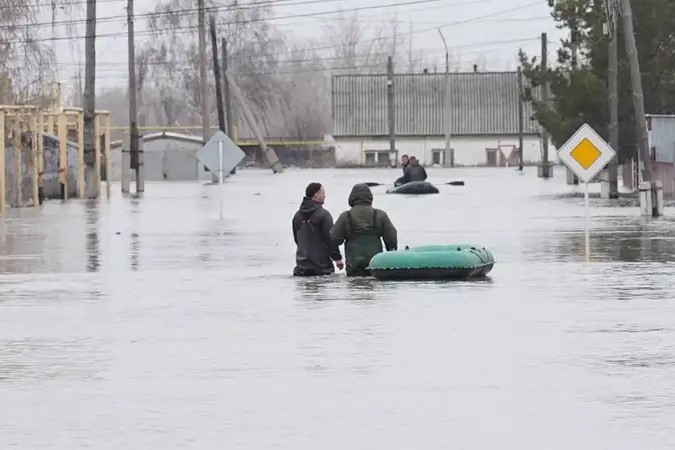This past week, the media paid attention to Tokayev’s address to the nation following major flooding incidents in West Kazakhstan and the announcement of a state of emergency in the region, Kazakhstan’s announcement that it will curtail oil “overproduction” in the country to support OPEC+ nations, Kazakhstan and Uzbekistan’s leaders’ summit where it was announced that both countries will cooperate on joint development initiatives, Tajikistan and Turkmenistan’s signing of bilateral investment and ministry-level cooperation agreements, and the United Nations High Commission on Refugees seeking $620 million from UN member states to aid Afghanistani migrants displaced in Pakistan and Iran.

Kazakhstan battles with Flash Floods and a Spring downpour unprecedented in the past 80 years. Source: Gov.Kz
Addressing the nation from Akorda in Astana, President Tokayev announced during a live broadcast that the escalating flood situation in West Kazakhstan, particularly in the city of Kulsary, amounted to the “biggest disaster in terms of its scale and consequences for the last 80 years.” The President declared a state of emergency across ten provinces where flooding has already claimed over 3,000 residences, necessitating the evacuation of over 75,000 residents, and completely cutting off about 60 settlements from any means of access or communications (Astana Times, Zakon). Prior to his address, Tokayev visited the affected region and its citizens, criticized the state’s hydrological service for not accurately forecasting the flood conditions in the country, and called on the Emergency Services Ministry to provide more programs to mitigate against future disasters by building more dams and runoff projects (Astana Times). Meteorological experts in Kazakhstan claim that the floodwaters will reach the nearby city of Atyrau in the coming weeks, causing more destruction and displacement (Tengri News). To respond to the growing disaster, Kazakhstan’s neighbor, Kyrgyzstan, has delivered 300 tons of humanitarian aid to assist those affected by the disaster (24.kg).
Following a virtual summit with the members of the OPEC+, Kazakhstan has announced that the country will cut its daily production of oil to compensate for overproduction in the past quarter. Kazakhstan will modestly lower its production rate from 82,000 barrels per day down to 78,000 barrels to “achieve full conformity and compensate for overproduction” of oil within OPEC and among the bloc’s observer nations (Astana Times). Russia has also made changes to its oil output allotments by focusing more on the domestic production of oil and decreasing its oil exports going into the second quarter of 2024 (Kaz Inform). Prior to this decision, the price per barrel of Brent oil had increased by 7.4% in March, reaching $87 per barrel (Newsline Kazakhstan).
Attending a summit in Khiva, Uzbekistan, Presidents Tokayev and Mirzoyoyev announced a joint investment package and development initiative plan between the two states to be rolled out over the coming years. The agreements drafted include “industry, energy, transport and logistics, and agriculture [projects] worth over $2.5 billion” (Astana Times). The meeting also featured President Tokayev’s signing of amendments on mutual travel between the two countries. This new Protocol allows citizens of both countries to temporarily reside in either country for up to 30 without a visa (Uzbekistan Daily). Furthermore, both sides signed onto an agreement to create a joint railway venture to facilitate the movement of people and goods across the China-Uzbekistan-Kazakhstan trade corridor. The meeting concluded with Tokayev stating that the two countries’ “fruitful cooperation” would lead to great economic results for both nations (Uzbekistan Daily).
Meeting in Dushanbe, Tajikistan’s President Emomali Rahmon and Turkmenistan’s Gurbanguly Berdimuhamedoev agreed on the enhancement of economic partnerships focused on the improvement of interstate relations in the areas of gas production, logistics, and agriculture, among other areas (Asia Plus Tajikistan). The discussions led to the signing of five bilateral agreements that support areas from province-to-province economic ties between Khujand and Arkadag City, building joint geological expertise to mitigate against the effects of earthquakes and diplomatic training for both countries’ Ministries of Foreign Affairs (Asia Plus Tajikistan). Both sides announced efforts to support interparliamentary cooperation with the establishment of the Turkmen-Tajik Parliamentary Friendship Group, which would support initiatives to support the cultural unity between both nations as well as to aid in the implementation of the United Nations’ SDG Goals (Turkmen Portal).
To respond to a worsening humanitarian crisis, where 4.5 million displaced Afghanistanis residing in Iran and Pakistan face food insecurity, deportation and disease, the United Nations High Commission on Refugees (UNHCR) has sought $620 million in donations from member states to support Afghanistanis in the region (Pajhwok). The Taliban-led government has further sought aid from the international community, in support of the UNHCR plan, for Iran and Pakistan to provide more than basic food aid for the migrants. A Taliban spokesman called on both states to further provide “job creation, housing, and cash assistance” to migrants housed within foreign borders (Tolo News). UNHCR leadership is further traveling to the host countries to gain an on-the-ground understanding of the situations faced by the migrants, and also to Afghanistan to ‘create a favorable environment’ for internally displaced persons and repatriations in the country (Bakhtar News).

